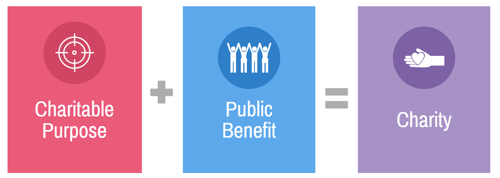The charity test
To be a charity in Scotland you must meet the charity test. If you don’t meet the charity test you cannot have charitable status or call yourself a Scottish charity.
What does it mean to have charitable status?
Having charitable status in Scotland tells the public, your supporters, funding organisations and people who benefit from your charity, that:
- your charity meets the charity test
- it is regulated by the Scottish Charity Regulator (OSCR)
- its charity trustees (the people who control and manage it) must meet certain duties and provide certain information to OSCR and to the public.
What is the charity test?
A charity must:
- have only charitable purposes, and
- provide public benefit in Scotland or elsewhere.

You cannot meet the charity test if:
- Your governing document allows the charity’s assets to be used for a non-charitable purpose. This applies during the lifetime of the charity and when it is being wound up (closed down).
- Your governing document expressly permits government Ministers to control the charity’s activities.This applies to both Scottish and UK Ministers.
- You are set up to be a political party or advance a political party. This doesn’t stop a charity campaigning or lobbying to advance its charitable purposes.
What is a governing document?
A charity's governing document is the written statement that sets out its purpose, structure and describes how it will operate.
The charity trustees must make sure that the charity follows its governing document, which usually contains key information about:
- what the charity exists to do (its charitable purposes)
- what powers it has to achieve its charitable purposes
- who the charity trustees are, how many charity trustees there should be and how they are appointed and removed
- whether the charity has any members and if so who can be a member
- rules about charity trustees' and members' (if any) meetings, how they are arranged and conducted and how decisions are made and recorded
- how to change the governing document
- how to close the charity down.
The name given to the governing document will depend on your charity's legal form. The most common legal forms for charities are:
|
Legal form |
Type of governing document |
|
Company |
Memorandum and articles of association |
|
Unincorporated association |
Constitution |
|
Trust |
Trust deed |
|
Scottish Charitable Incorporated Organisation (SCIO) |
SCIO Constitution |
|
Community Benefit Society |
Rules |
Charitable purposes
Charitable purposes are the first requirement of the charity test. Your charity’s purposes will be set out in your governing document. They say what the aims of your charity are and what it has been set up to achieve. They might be called objects, aims or purposes.
Your charity’s purposes don’t need to be exactly the same as the charitable purposes in the 2005 Act, but it should be easy to see how they relate to them. Detailed guidance about each purpose can be found in our Meeting the Charity Test: Guidance.
If you want to change your charitable purposes you need to ask OSCR for permission first. Detailed guidance on this can be found on our Making changes and reorganising webpage.
Public benefit
Public benefit is the second requirement of the charity test and key to being a charity. Charities can provide public benefit in many different ways.
Put simply, public benefit is the way your charity makes a positive difference through the activities it does to advance its charitable purposes.
Our Guidance on the individual charitable purposes has more information on what activities may provide public benefit when advancing each charitable purpose.
All charities must describe the work that they do, and their achievements, in a Trustees Annual Report. This is one part of the annual report and accounts that every charity must prepare and file with OSCR. This information allows the public to see how your charity makes a positive difference and how you provide public benefit.
It is important to explain how you provide public benefit and to review your charity’s purposes, activities and achievements annually.
Other factors that can affect whether you provide public benefit
Private benefit
This is when someone benefits from your charity’s activities as a private individual, rather than as a member of the public. If this happens we need to decide how this private benefit compares to any public benefit your charity provides.
Too much private benefit can mean your charity fails the charity test. We need to look at the amount of the private benefit and decide if it is incidental to how your charity provides public benefit:
- incidental means that the private benefit is a necessary result or by-product of your charity’s activities.
For example:
Your charity has paid staff, because without them your charity could not function. This is private benefit to the individuals being paid salaries, but it is necessary for your charity to be able to advance its charitable purposes and provide public benefit.
Disbenefit
Disbenefit is the opposite of benefit and we take it to mean the same as detriment or harm to the public. If there is disbenefit that outweighs any public benefit, your charity may fail the charity test.
Undue restriction
Many charities have to limit the number of people who can benefit from their activities. Restricting public benefit is fine as long as you can show that the restrictions are reasonable, lawful and justified. In other words, they are not undue restrictions.
For example:
Your charity might need to charge for some or all of its activities. You should be able to show that the charges are reasonable for the activity and where possible help is given to those who can’t afford the charges.
